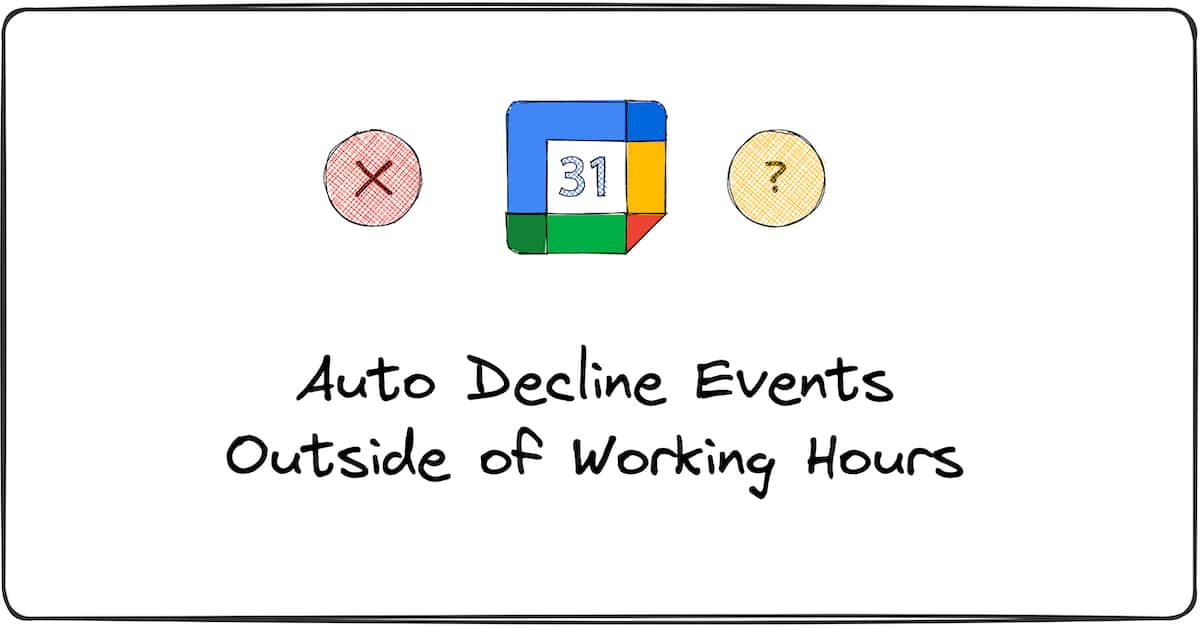The Problem
In this age of remote work, navigating multiple timezones can sometimes result in an accidental 6am or 7pm meeting. While Google offers a “working hours” feature as part of their business plan, it can easily be missed by meeting organizers, especially if they are using a Google Calendar alternative to schedule events.
The Solution
To help mitigate this, I created a script that automatically responds to these non-working hour meetings. You can either decline the meeting, or mark your attendance as “Maybe” for a slightly less aggressive approach.
Setup Instructions
- Create a new Google App Script project – here.
- Copy and paste the code below into your new project.
- Change the variables in the “User Inputs” section.
- Run the “createMeetingResponerTrigger” to create a recurring trigger.
- If you ever want to delete the trigger, you can run the “deleteMeetingResponerTrigger“
The Code
// ----------- USER INPUTS ----------------//
var myEmail = 'YourEmail@example.com';
// Days of the week you want to decline events for
// 0 for Sunday, 1 for Monday, 2 for Tuesday, and so on.
var declineDays = [6,0];
// Your working hours
var startTime = 7.5; // 7:30am
var endTime = 17; // 5:30pm
// Event Autoresponse [MAYBE, NO, YES]
var autoResponse = CalendarApp.GuestStatus.MAYBE
// -------- END OF YOUR INPUTS -------------//
function autoMeetingResponer() {
var calendar = CalendarApp.getCalendarById(myEmail);
var startDate = new Date();
var endDate = new Date();
endDate.setDate(endDate.getDate() + 14);
// Get all events between the start and end dates
var events = calendar.getEvents(startDate, endDate);
for (var i = 0; i < events.length; i++) {
// Get the event time in hours
var eventStart = events[i].getStartTime().getHours() + (events[i].getStartTime().getMinutes() / 60);
var eventEnd = events[i].getEndTime().getHours() + (events[i].getEndTime().getMinutes() / 60);
var eventStatus = events[i].getMyStatus(); // Get the status of the event for the current user
var eventDay = events[i].getStartTime().getDay(); // get the day of the week for the event
// Check if the event is outside working hours OR if you are the creator of the event
if (eventStart < startTime || eventEnd > endTime) {
if(eventStatus == CalendarApp.GuestStatus.INVITED) {
events[i].setMyStatus(autoResponse)
Logger.log("Set due to time")
}
}
// Check if the event is on a non-working day OR if you are the creator of the event
if(declineDays.indexOf(eventDay) != -1){
if(eventStatus == CalendarApp.GuestStatus.INVITED) {
events[i].setMyStatus(autoResponse)
Logger.log("Set due to day")
}
}
}
}
function createMeetingResponerTrigger() {
// Create a trigger to run the autoMeetingResponer() function when a new event is added to the calendar
ScriptApp.newTrigger('autoMeetingResponer').forUserCalendar(myEmail).onEventUpdated().create();
}
function deleteMeetingResponerTrigger() {
// Get all existing triggers
var triggers = ScriptApp.getProjectTriggers();
// Iterate through the triggers
for (var i = 0; i < triggers.length; i++) {
// Check if the trigger is for the autoMeetingResponer() function
if (triggers[i].getHandlerFunction() == "autoMeetingResponer") {
// Delete the trigger
ScriptApp.deleteTrigger(triggers[i]);
}
}
}
